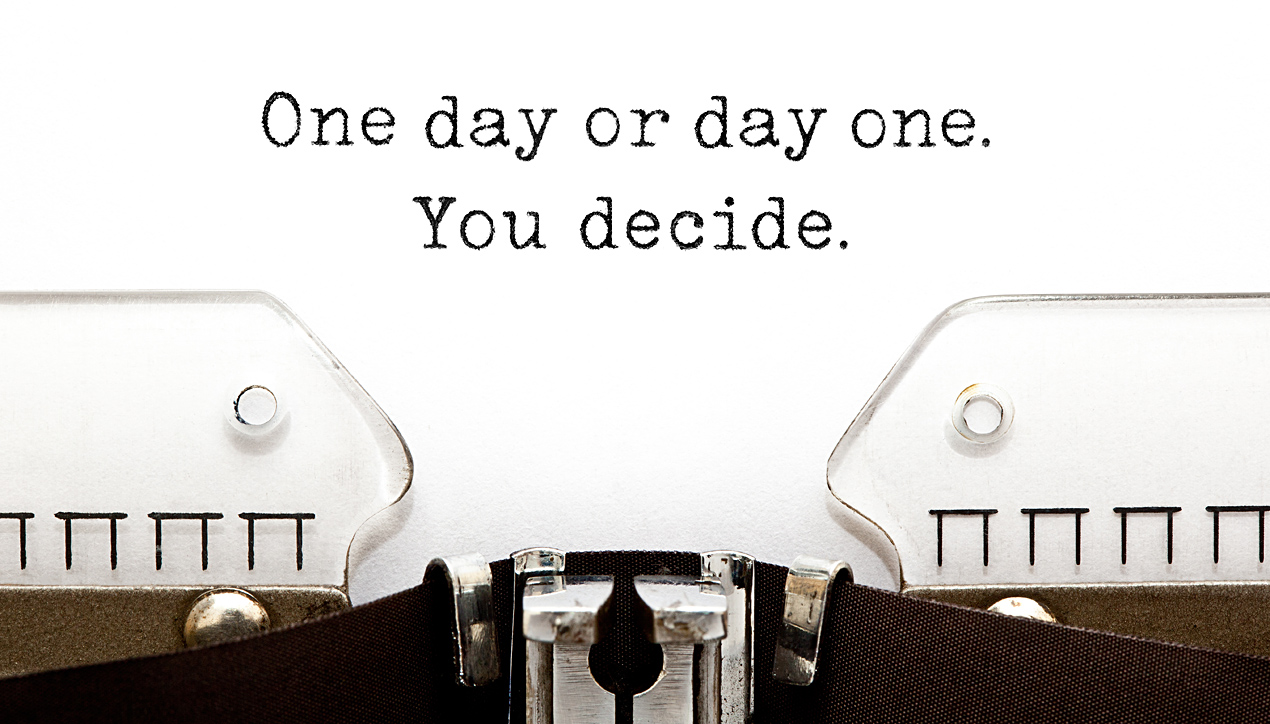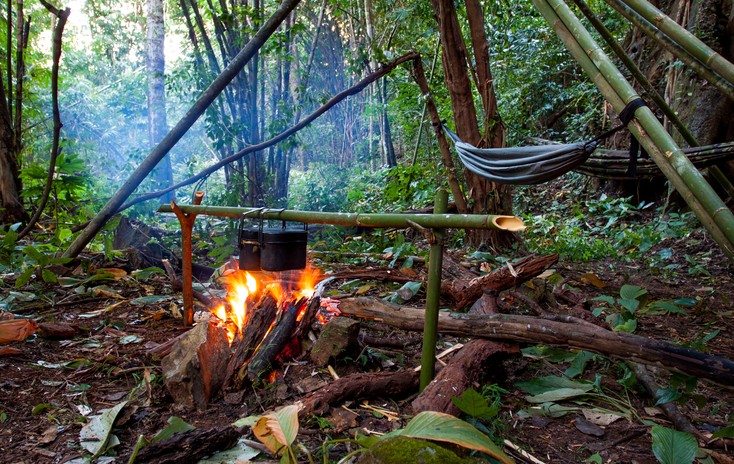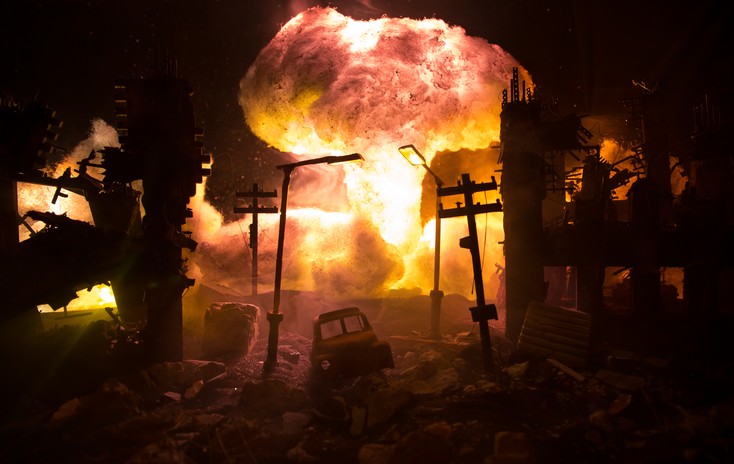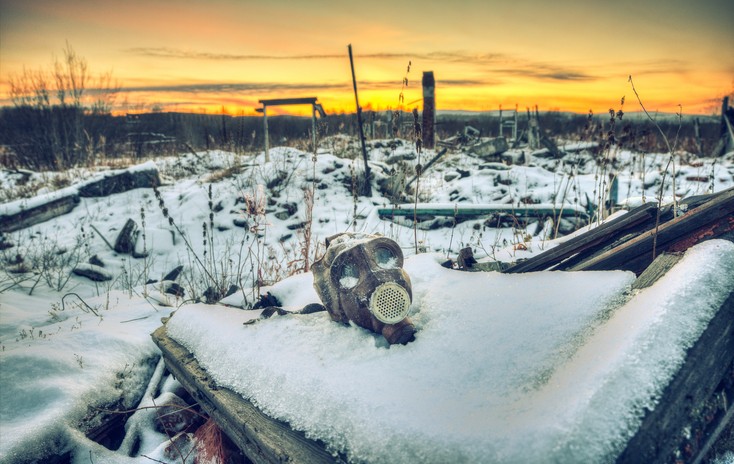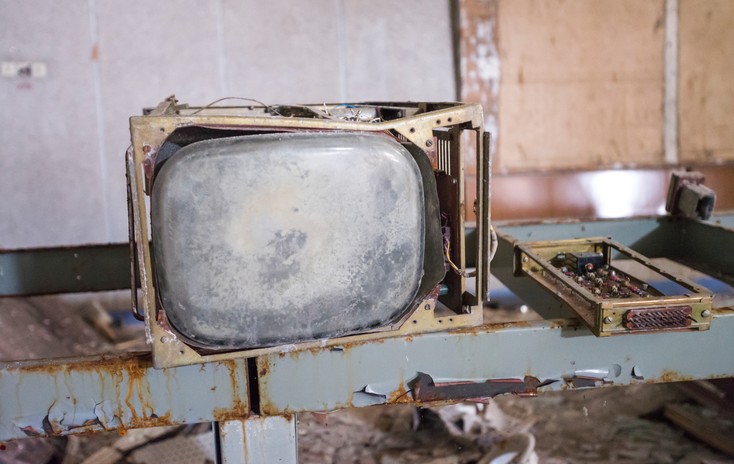Restart - Begin Prepping Again From the Start
I just had the idea to imagine that I'm starting all over again with prepping. The more I thought about this idea, the more I liked it. So I've decided to actually do it— and begin prepping all over again, as if I've never done it before. I thought of several reasons to follow through with this idea of a "restart", which I'll gradually explain over the page...
I bought the book "Absolute Anarchy: Interactive Study Guide to Surviving the Coming Collapse" by Johnny Jacks perhaps a year ago, and it's been sitting in the cupboard while I've gotten on with other things. A couple of nights ago, I got it out and finally started looking through it.
On the same night I got it out, I also read the Bible book of 2 Timothy. Immediately after that, I suddenly had the idea to pretend I've never done any prepping before, and that I'm completely new to this whole thing. Like I'm beginning prepping all over again — from the very start — and writing the experience of it up online, on this website.
Reasons For a Restart
One of the reasons I decided to do it this way is this is the place where every other beginner is at. The beginning. Not at the place of having learned self-reliance as a boy helping your sharecropper parents with subsistence farming, then serving in the Green Berets for 22 years as a guerrilla warrior in several countries while mastering survival skills in extreme environments, and then spending 25 years honing and developing national security and emergency preparedness policy. (Like the author of Absolute Anarchy).
Another reason is that I suspect there's other somewhat-experienced preppers out there who can benefit from this idea also. Like myself, many preppers have been prepping for a while and aren't yet in a position to realistically survive a total collapse of modern society (and/or a collapse of the economy, WWIII, etc.). After a while this can get discouraging. Doing a "restart" — as if starting prepping all over again — changes your focus from expecting yourself to have become fully self-sufficient by now, to expecting yourself to know (and have) nothing at all. Which means that whatever skills and preps you do have, instead of seeming inadequate, and behind where you should be up to by now — you can now think of as an extra bonus asset, meaning you're ahead of where you "should" be up to by now (which, since you're starting again from the beginning, is nowhere, apart from your ordinary modern life situation and the desire to be a prepper).
Another reason is that now, in 2019, there's literally more than 1000 times the amount of information freely available online than there was when I first began writing about these topics in the early 2000s. YouTube didn't even exist until 2005. Things are a lot different now. Everything you would want to know is already there, somewhere. So there doesn't seem to be that much of a need to add more information to that. What I think is really needed now is a way to try to make this information more accessible to ordinary people, more popular, more like something that everone should be doing. Everyday, normal people — not just extremists and not just super-fit hyper-trained experts with decades of elite experience. Also my aim is to provide somewhat of a roadmap (or treasure map if you prefer that comparison) through the existing online information, in a way that anyone could follow it.
Another reason to do it this way (starting over again) is that I can still remember what I felt and thought as I did these things for the first time myself. And write about those experiences. And how things might be done better with the benefit of hindsight.
Another reason is that, already having some experience (even if not that much), and a little bit of gear and stored things (also not that much), I should be able to make progress with enough speed that I can add new content to this website regularly. I don't have a massive production budget nor a team of writers, and camera people, and experts in a whole range of fields to work on this. Instead, what I do have is little experience in many different areas. So if I imagine that I'm beginning again completely from the start, I should (at least in theory) be able to produce a "Web Magazine" on my own — and keep up with a production workflow as expected of a magazine — with fresh new content and exciting, relevant images...

Photo by Tony Hisgett/flickr. Shipping containers are sometimes used as quick and cheap buildings or (if the correct precautions are taken to strengthen the walls and ceiling) underground bunkers for prepping. They have already saved lives in Australia. Disclaimer for the building owners: I found this photo searching Google images for "restart". These actual buildings in real life are no more likely to be full of prepping supplies than any other random buildings anywhere in the world.
Personal Issues
I have some health issues which make prepping difficult for me personally. And very possibly, when it eventually comes to the crunch in terms of surviving a total collapse of society, completely unrealistic. I'm a prepper because, like being a breather of oxygen, for me it would be impossible not to be one.
Our parents have a lot of influence on our lives, much more than is commonly acknowledged. I suspect the main reason that I persist with prepping, against what often seems like all odds, is to honour my father. Dad got cancer when I was 12, and died from it when I was 13. When I was nine, he told me that in the first part of the next century, the oil was going to run out, and society would collapse, "but it would be okay because I could learn to survive in the bush". I'm not a prepper because I have any amazing abilities at it. In fact probably the complete opposite is true — and any average person, in average health, should have a far better chance of succeeding at prepping and survival than I have.
There's an old saying that says,
If you can't do,
teach.(And if you can't teach... Teach gym.)
So I'm going to try to follow that plan. Since I feel compelled to be a prepper— and someone (e.g. perhaps you) might as well get some benefit out of it (if it's unlikely to be me). Also, a few years after I became a prepper, I became a Christian. Jesus and many other Christian role models were a lot more concerned with spreading their message than they were about "OPSEC".
The message of prepping.com.au is that people need to prep for the coming end of modern civilisation as we know it, and that anyone and everyone should be doing it. Irrespective of how good at it you may or may not be. Seriously, if I can do this (be a prepper), anyone can do this.
Where to Start?
My plan is to go through the book Absolute Anarchy and attempt to follow it, one step at a time, and write it up on prepping.com.au. You can get the book here if you like (link to be added soon). It doesn't 100% matter if you don't have the book, since I'm going to explain everything in detail anyway.
Also I'm going to add things that apply to me specifically. Everyone has their own individual quirks and issues — and of course you would swap these for your own issues in your own prepping. Some of the issues people have are very challenging indeed, and there are many people out there in a much worse situation than I am in. Though most people would be a much better situation overall, apart from perhaps the one and only detail that most people (at least currently) aren't even bothering to start prepping. In that old story, the tortoise won the race, not the hare. And in the world of prepping a lot of things are very hard to predict. I haven't entirely given up hope of succeeding at this.
I'm mostly writing to average modern Australians who come from cities and suburbs (since that's my own background, and also that of the majority of Australians). And other people around the world in similar situations. And anyone else who can get anything useful from this information.
Reasons why I've chosen "absolute anarchy"
- It's a relatively recent book, first published in 2016.
- The back cover spiel sounds very impressive.
- It has very good reviews on Amazon.
- Being a new book, I haven't already read it. Which helps with the whole "restart" theme since, the book is new to me as well.
- There's some Christian content. Which, being a Christian, obviously appeals to me. Of course you can be a prepper without being a Christian. Though many preppers are also Christians, and (apart from other reasons to become a Christian) it does help a lot with prepping.
- I don't think the Christian content is that much of the book to turn non-believers completely off it. If you're not a Christian — consider that I personally very much like, and recommend, and have learned a lot from the LDS (i.e. Mormon) Preparedness Manual. And I'm not a Mormon. So you can think of it like that.
My first thoughts flicking through Absolute Anarchy are that it all looks very interesting, but also intimidating. Things are dire. There's going to be a crash. And there's a lot of stuff in the book. And if I don't know it all, I'm gonna die. I imagine that many people have these kinds of thoughts when first looking at this kind of material.
I've been a Christian for less years than I've been interested in prepping and survival. So when I first learned about prepping, I had a lot of different reactions — but none of them were feeling safe and secure that I was loved by God, and looking forward to a happy future in heaven in the afterlife. If you believe in a heavenly future that awaits you, I think it's a lot easier to deal with the thought of your impending death. Plus, there's a lot of Christian material that explicitly teaches how to deal with extreme physical adversity — which is obviously a useful skill for a prepper to have.
On the other hand, I think a lot of people who do already believe in a heavenly future think that because God is going to look after them, why bother going to all this effort of self-reliance and learning and doing things for yourself. (Eventually I'll write a whole page about this issue). So not all Christians are motivated to be preppers.
But if you have no belief or hope of an afterlife, and you've (sensibly) arrived at the conclusion that that modern civilisation does not have that many years left in it, and you want to be able to stay alive — that's a lot of pressure to live up to. I think many people prefer to forget about the whole thing and go back to modern life. Imagining (i.e. pretending) that it can somehow continue to exponentially grow, indefinitely. Or at least long enough for their great grandchildren to grow up and live an averagely long life. Which is about the furthest into the future that most people think about in a practical way.
Another reason is that following a book (even though I'm sure I'll end up going off track and "off-topic", since I do that with almost everything I do) will give me an overall plan of what to be doing, and where I'm going with this. And make sure I cover all the essentials. And in a good order of priority for people to really do them for themselves, and not leave out anything important. That's the idea anyway.
Quickly flicking through the book Absolute Anarchy reveals one disadvantage in terms of using it after a total collapse. There's a large number of references to internet/web links. Which means you'd have to, at the very least, visit those sites once and print the relevant pages as hard (i.e. real paper and ink) copies before there's no more internet.
This disadvantage isn't the worst thing ever — of course it's impossible to fit everything you will ever need to know about everything all in the one book. This website prepping.com.au is going to have plenty of web links too, and for the same reason. But this is very important to be aware of if you're thinking you can buy the book, and keep it on your bookshelf, and not look at it until there's a real emergency situation — and the emergency/disaster might involve you not having internet access at that time (or perhaps not ever again).
Where I'm Up To Right Now
When I first started writing this website six months ago, I wrote something like "I'll start with doing an audit of my own preps" and where I'm up to so far. As of today, that idea has been replaced with the new idea of starting all over again from the beginning.
So here's my audit of my own preps, and where I'm at so far (for the purposes of this "restart" idea, i.e. at the very beginning):
Nothing.
I'm old enough to remember the old TV cooking shows, where they just showed you how to cook things. Before all the "reality" TV competition-style ones became the norm. They'd demonstrate how to cook something which usually took longer to prepare and cook than the length of the episode. And prepare and cook it "all" in front of your eyes on camera on the show. Except that quite often (because the show didn't last for the whole 3 hours it took to make a roast, or whatever they were cooking) they'd bring something out and say "now we'll add in this [whatever it was] that we prepared previously". That's kind of how this restart idea is going to proceed.
Summary of This Page So Far
If that was a lot to read, I'll summarise the most important points right now:
- Effectively, I'm starting prepping all over again from the beginning, as if I've never been a prepper before, and I'll be writing it up on this website regularly from now on.
- I'm not a massive expert at this by any means (even without pretending to know nothing at all). In fact I have some very significant disadvantages compared to average people. Which will be explained in due course...
- Therefore I can do this, anyone can do this.
- That means you can do this.

Imagine that beginning with prepping is being like beginning, and planning for, a new adventure — because you are beginning a new adventure. Photo by Simon Migaj / Unsplash.
Optional Section — The Bible Book of 2 Timothy
If this is your thing, or even if you're just curious, have a read of the book of 2 Timothy in the Bible. (The link is given at the end of this section). It's one of the shortest books in the Bible. If you've never read a whole entire book of the Bible from start to finish, now's your chance. I read 2 Timothy last night, and then immediately after that I had the idea to write this web page. So it's entirely thanks to that book that you're reading this page now.
Paul's sacrificial attitude towards his Christian ministry also inspired me to be less concerned about "OPSEC", i.e. OPerational SECurity, i.e. hiding from the rest of the world that I'm a prepper — and more concerned about spreading the message that everyone should start prepping ASAP.
Paul is writing this letter from jail. The shame he mentions refers to the way ordinary Roman citizens thought of people in jail — that is, as criminals who deserve to be punished. Not respected or revered, and absolutely definitely not the kind of person whose letters would end up read by generations of people over 2000 years as the divinely inspired wisdom from God.
I think 2 Timothy is a really good read for preppers for several reasons. Including:
- It's written from jail (a worse situation than most preppers are in currently).
- Paul compares things to the military, athletics, and farming, which are all topics of interest to preppers.
- Paul writes about the last days of civilisation (obviously relevant to preppers).
- Paul is about to die soon, and he knows it — and he's a first-class role model for the attitude that it's possible to have as you face your eventual death (as all of us will one day).
Stories of the Christian martyrs are the best inspiration I've ever discovered for how to face extreme difficulties and death without losing hope and with keeping a positive (and often even actually happy) attitude.
If you've never read the Bible much before, it's good to be aware that it was originally written in a different language to English (in this case Koine Greek). Which means that the English translation can sound a bit awkward in places. With all Bible translations, there's a trade-off between using words that most exactly match the original words (i.e. a more literally correct translation), versus slightly (or in some cases extensively) re-wording the phrases and sentences — which makes them read better in English but also means they're less of a literal copy of the original text of the Bible.
The translation I've provided in the link below, the World English Bible, is biased more towards accuracy of the words — and less towards grammatically-correct-sounding English sentences — than some other popular Bible translations.
Probably the most famous verse in 2 Timothy is Chapter One, Verse Seven:
For God didn't give us a spirit of fear, but of power, love, and self-control.
Which is a good verse to memorise, and then to think of when faced with any kind of disaster (such as the kinds of disasters that preppers are preparing for).
The "book" of 2 Timothy is actually a letter. The "2" means it's the second letter that the Apostle Paul wrote to Timothy (a younger preacher) that's included as part of the Bible. It's also the last letter (and last Bible book) that Paul wrote before he was put to death (i.e. executed) because of his Christian faith.
According to historical accounts Paul was beheaded. Which, incidentally (and if it's not already obvious) would be a much, much better way to die than being crucified. Unlike at least most (and I think probably all) of the other Apostles, Paul was a Roman citizen. Crucifixion was not generally used on Roman citizens. Wikipedia has a detailed list of historical accounts of Paul's death, most of which I didn't already know until I looked it up as I was writing this paragraph.

I'm imagining what it would be like to start life all over again, from where I am right now, as if these were the only two material posessions I owned. Absolute Anarchy by Johnny Jacks, and the ESV Archaeology Study Bible. The peace and reassurance that comes from reading the Bible with an attitude of faith is a great contrast to the stress and uncertainty that comes from contemplating and planning for the collapse of modern civilisation.
I think the ESV Archeology Study Bible is a good choice for preppers, because the study notes go into a lot of detail about history — including the history of of how people lived back then. The notes in most study Bibles mainly explain the writer of the notes' opinions about theology, which is open to interpretation. This one has study notes based on the history and customs and lives of the people in ancient times, explaining some of the details about how they lived, long before modern technology.
The letters in the Bible are sometimes called "epistles", which comes from á¼Ï€Î¹ÏƒÏ„ολή, the Greek word for letter. Even if you don't know the Greek alphabet you may recognise the second letter of this word as "pi" from maths, which in Greek is the "p" sound. To cover the rest of the word, the o-like letter with a bit sticking out at the top right (σ) is called sigma, and makes an s sound. The upside-down y looking letter is lambda, which makes the L sound (not too hard to remember). And the ή, called eta, at the end of á¼Ï€Î¹ÏƒÏ„ολή looks like an English n — but makes a long e sound (confusing for English speakers). The other letters sound like what they look like in English. So "á¼Ï€Î¹ÏƒÏ„ολή" written using English letters would be "epistole". For some reason that I don't know, the "o" has been left out of the modern English spelling, epistle.
Ancient languages may not be of much interest to most preppers (nor do they need to be). But it's always good to be reminded that there have been many civilisations which rose and fell over the course of human history. And also that there were many civilisations where people survived just fine before modern technology (like electronics, etc.) was invented. Living (as we are) in the final years of our civilisation isn't something that's never happened to people before.
There's a huge amount that preppers can learn from studying history. The main difficulty with this is that so much of recorded history (including historical fiction/literature) is based around the ruling classes and the lives of the rich. And doesn't cover nearly as much of the everyday lives and the practical things that ordinary people did to survive in the days before technology. However there is a lot of that kind of information out there, you just have to sift through all the stories about kings and queens (etc.) to find it.
Click here to read the book of 2 Timothy in the Bible.
Where to go next from here?
I've now read the first few pages of Absolute Anarchy and flicked through some more of the book. There's a lot of ground covered in the book. Which is good, but it doesn't seem like the best plan to cover everything in the book in strict page number order, from start to finish. One of the reasons not to is there's a lot of "consideration" type material near the start, and I want to start this off with something practical (in the sense of a practical task that you actually do, next, after finishing this page).
The Starting Line and the Finish Line
The other day I wrote a section on about planning your prepping from both "ends". Where the first end (the starting line) is what you can do right now that you would need if society collapsed now. And then you think forwards from there, in terms of what needs to be done next to extend the amount of time you could survive without modern society.
And the other end (the finish line), is thinking about where you would need to be at to survive indefinitely without modern society. And then you think backwards from there, in terms of what you must do between now and then to get to that ultimate goal of surviving the collapse of modern civilisation.
So, beginning from the starting line (i.e. the place you're at right now):
If there was really a total collapse of modern civilisation right now, what would I need the most and the soonest, to stay alive right now?
The first thing that comes to my mind is water. This will be true for many people. Depending on the type of collapse, running out of water may end up being be the thing that kills the most people out of everything. Especially when you consider that fresh water in large cities is currently only available in large quantities using electricity-powered technology. One there's no more mains electricity, there will be no mains water for most people — and this will be the biggest immediate concern for many.
So that's what I'll write about next. After that, I'll do a page working on the finish line. And from there I'll continue adding pages, very approximately alternating between each of the two "lines".
Next page: How Much Water Would You Have If the Taps Ran Dry?
Alternative next page: How to Really Begin Prepping.
Prelude to Catastrophe The world had been teetering on the edge of conflict for years. Political tensions, economic rivalries, and territorial disputes had escalated, creating a global atmosphere of distrust and fear. Nations fortified their borders...
Nuclear Winter
A nuclear winter is a theoretical scenario that would follow a large-scale nuclear war, characterized by severe and prolonged climatic cooling and other catastrophic environmental effects. Here's what it might be like: ...
Movies and Video About Nuclear War
Here are some online videos that are recommended for preparing to survive nuclear war, and general nuclear war and nuclear bomb information: Protect and Survive ...

 Welcome to Prepping.com.au, the new web magazine.
Welcome to Prepping.com.au, the new web magazine.
 What is Prepping? A guide for normal people to get started.
What is Prepping? A guide for normal people to get started.
 How to use this site. When all else fails, read the instructions.
How to use this site. When all else fails, read the instructions.
 This is your mission, should you choose to accept it.
This is your mission, should you choose to accept it.

